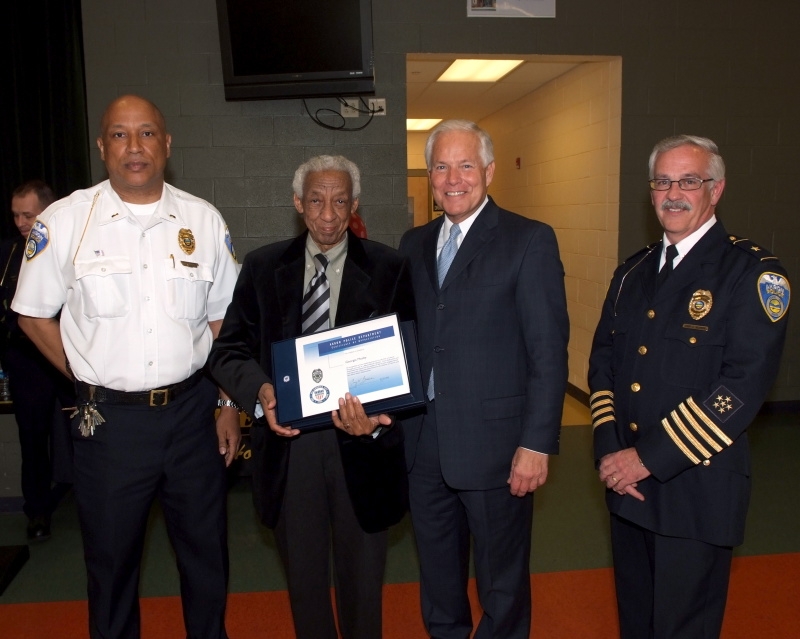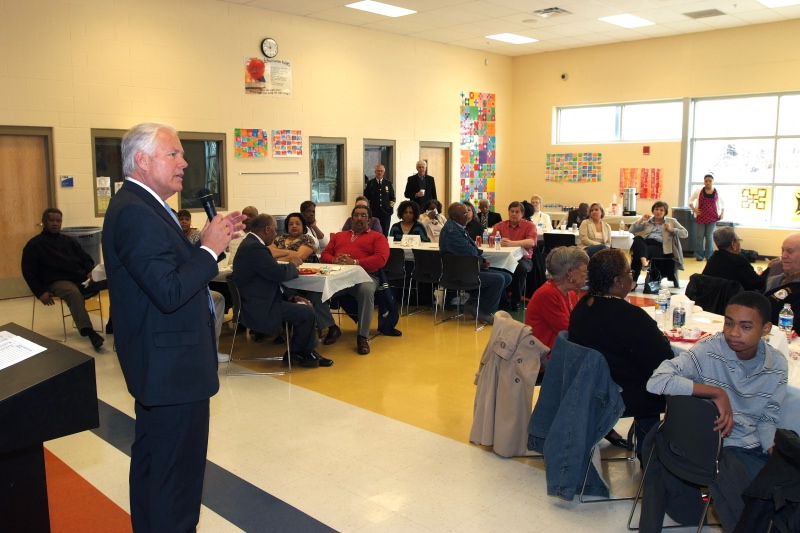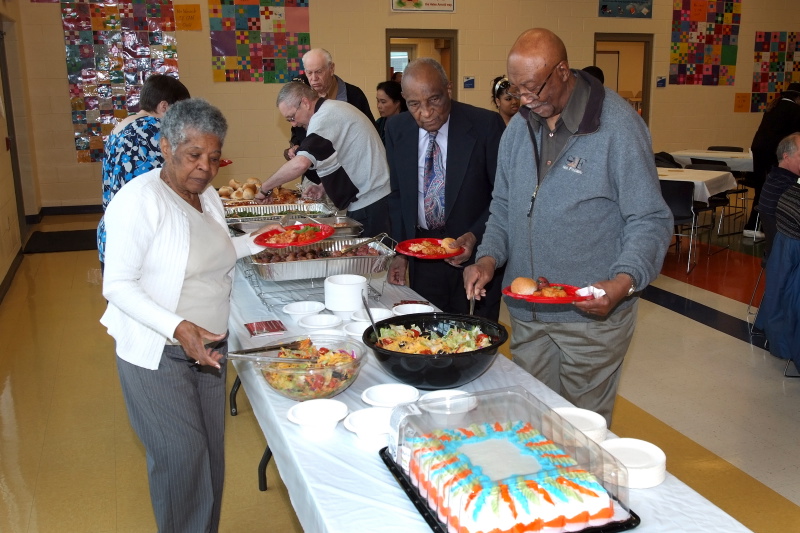Akron Block Watch: Keeping Team Spirit Alive
Neighborhood Watch has long been called the extra “eyes and ears” of law enforcement, but in cities across America, the program has evolved into something more—a complex relationship that unites citizens, government leaders, and community policing officers as equal partners in crime prevention and community safety.
Additionally, many Neighborhood Watch organizations are extending their reach by addressing issues such as community revitalization and disaster preparedness. It is not uncommon to see Neighborhood Watch members organizing community cleanup days, for example, or taking part in first aid training and other activities aimed at improving the health and welfare of local residents.
As Neighborhood Watch members increasingly shoulder more responsibilities, recognition of their contribution and expertise becomes critical. By cultivating a healthy, productive partnership with their crime prevention volunteers, law enforcement agencies can successfully fight crime while ensuring good relations with the communities they serve. One such organization that has consciously worked to strengthen the bond with its Neighborhood Watch program is the Akron Police Department. The agency recently organized its first block captain recognition ceremony and is exploring ways in which to encourage volunteer participation in its future planning efforts.
The Height of Success

The birthplace of such corporate giants as Goodyear and Firestone, Akron is a city built on industry and achievement. The name Akron is derived from a Greek word meaning “summit” (from the same root as “Acropolis”). It should, therefore, come as no surprise that this northern Ohio metropolis is home to a network of dedicated, high-achieving volunteers.
Managed by the Akron Police Department, the Akron Block Watch, as the city’s Neighborhood Watch program is called, dates back more than 23 years. Today, 13 sworn police officers from the department’s Community Oriented Policing Service (COPS) serve as liaisons to the city’s 140-plus city Block Watch groups, which comprise approximately 1,000 members.
Home to just over 200,000 residents, Akron has managed to steer clear of the violent crime patterns that plague many of its larger counterparts. Nonetheless, drug- and gang-related crime, burglary and petty theft, juvenile curfew violations, and quality-of-life issues keep law enforcement officers on constant vigil. Drug enforcement, in particular, has proved challenging due to the methamphetamine epidemic that has threatened to ravage the Midwest. In 2008 alone, law enforcement officials raided and dismantled 68 meth labs operating within Akron and greater Summit County.
Combating illegal drugs and other crimes requires training and experience. Quarterly instructional sessions sponsored by the Akron Police Department afford Block Watch captains the opportunity to hone their observation skills—a critical yet sometimes overlooked key to effective crime prevention. “We teach our volunteers how to report,” explained Lt. Chris Brown, commander of community relations. “They learn how to recognize the signs of a possible meth lab site, for example. In the case of robbery, we teach our Block Watch captains how to give a good description of the suspect when they call the authorities.” Training also equips participants with skills needed to improve safety within their own neighborhoods. “Our captains are taught how to take care of other residents living on their block. If they see newspapers piling up on a neighbor’s driveway or grass that hasn’t been cut in a long time, they will check to see if that person is out of town or has fallen sick or been injured.”
Vigilance is paying off, as demonstrated by declining crime rates within Akron’s active Block Watch neighborhoods. In one instance, Lt. Brown noted, a Block Watch group received information that a serial burglar was on the prowl. Members began gathering details about the suspect and compiled a description for police, who then were able to apprehend the perpetrator.
Credit Where Credit Is Due
 Akron Mayor Don Pusquellic addresses the city’s Block Watch captains.
Akron Mayor Don Pusquellic addresses the city’s Block Watch captains.
Today, crime prevention activities comprise only a fraction of the duties the average Neighborhood Watch block captain may be called on to perform. The Akron Neighborhood Watch Program Manual lists primary responsibilities as leadership and coordination, service as a liaison between the police department and residents, new member recruitment, map compilation and list management, distribution of crime news and trends, and coordination with fellow Block Watch captains.
In reality, for many members, Block Watch activities expand far beyond any bulletized list. Fundraising drives, neighborhood cleanups, teen mentoring programs, National Night Out events, and other projects make for a very full plate for Akron’s cadre of dedicated volunteers, whose efforts have not gone unnoticed by law enforcement. “I’ve been in this role since 2001 and everything I’ve asked of our volunteer leaders they’ve done,” Lt. Brown acknowledged.
On March 28, the Akron Police Department formally recognized its Block Watch captains for their hard work with its first annual awards ceremony. Akron Mayor Donald L. Plusquellic and Police Chief Craig Gilbride were on hand to greet and take photographs with the nearly 70 attendees, who also enjoyed a buffet dinner and received certificates of appreciation. Of the event, Lt. Brown said “The greatest gift you can give your community is service. The awards ceremony let volunteers know they are adding value and are needed by being recognized by the city’s senior leadership.”
Volunteerism in America
 Akron Block Watch captains were treated to a buffet during the recent awards ceremony.
Akron Block Watch captains were treated to a buffet during the recent awards ceremony.
Akron is but one of thousands of American communities with a strong volunteer tradition. According to a 2008 Bureau of Labor Statistics report, nearly 61 million Americans—one quarter of the population—volunteer nationwide. Although volunteerism rates are highest among people in their mid-30s and 40s, statistics indicate that Americans of all ages are ready, willing, and able to lend a helping hand if properly motivated.
Two major challenges many nonprofit organizations face are retaining an active volunteer pool and reducing turnover. The Corporation for National and Community Service (CNCS), an independent agency of the U.S. federal government, offers a series of online resource publications (www.nationalserviceresources.org/topics/service-activities) designed to help nonprofits effectively manage their volunteer programs.
First and foremost, the CNCS recommends keeping volunteers stimulated and challenged: “An idle volunteer is one that is unengaged and less likely to want to participate in future projects.” Turnover among Akron Block Watch participants is low, thanks in great part to the Akron Community Oriented Policing Service’s diverse training opportunities. In addition to learning effective crime reporting skills, Block Watch captains are invited to participate in trainings on topics ranging from homeland security to gang recognition to safe information collection. Quarterly participation is encouraged, and captains frequently return for multiple trainings, according to Lt. Brown: “We give our Block Watch captains expandable notebooks to add training information each time they attend a session.”
Equally important, according to the CNCS, is ongoing, open communication between volunteers and the organization they serve. Periodic assessments that address which programs and initiatives work well and which need to be tweaked or overhauled help ensure volunteers and law enforcement are focused on a common goal. Akron Block Watch members are regularly apprised via email of departmental and city news and events. Sworn officers also attend Block Watch meetings to share important crime-related data and field questions from volunteers. After all, Lt. Brown noted, “They’re stakeholders—we all are. We all live where we work.”
The Akron Police Department has also incorporated innovative role-play during Block Watch events in order to dispel misconceptions and let participants safely experience crime-fighting from the law enforcement perspective “At one point, we had several unsolved homicides, and I was sure that the community wondered why the police hadn’t solved them,” Lt. Brown explained. He and his staff staged a start-to-finish mock homicide and crime scene response to the event prior to a regularly scheduled Block Watch meeting. Attendees, who had been unaware that the event would take place, were interviewed “on the scene.” Afterward, they proceeded to the classroom, where officers replayed the shooting step-by-step as “witnesses” put their crime reporting training to the test, comparing the descriptions they had given with what actually occurred.
From this experience, participants learned that crime scene investigation is much more difficult than TV cop dramas lead us to believe, and seemingly unrelated factors often come into play. “It was cold, and some of our Block Watch members complained about the weather conditions,” Lt. Brown noted. “This fed into the training because it illustrated how something such as weather can affect events.”
As the scenario above illustrates, volunteers want and need to feel involved in problem-solving, decision-making, and objective-setting. Neighborhood Watch members who have a stake in current and future planning and assessment feel a stronger sense of involvement and appreciation than those who sit on the sidelines. References to specific successes and accomplishments of previous tasks, projects, and assignments boost morale and help sworn officers and volunteers chart a course for future initiatives.
The recent awards ceremony afforded the Akron Community Oriented Policing Service the opportunity to provide an overview of long-term departmental goals and solicit feedback and ideas. “Our volunteers help shape how we police, and we want to give our Block Watch leaders a better platform for dialoguing questions,” Lt. Brown said. Plans are now underway to form a special committee composed of representatives from the Akron Police Department and mayor’s office and the city’s Block Watch captains. The committee initially will focus on selected hot-button issues, including quality-of-life complaints (e.g., loud music, drug houses) and recidivism. “We want to correct the repeat offense problem by focusing on individuals who are continually in our system and a strain on public resources. We will ask them for a change of behavior and direct our resources into making sure these people correct themselves,” explained Lt. Brown.
As committee members, block captains will offer valuable input and receive timely feedback regarding the future direction of Akron’s law enforcement and crime prevention program. Participation will also offer members more frequent opportunities for recognition of their tireless work and dedication. A critical component of every volunteer program, recognition is often downplayed or sporadic. Successful organizations, however, understand that both scheduled events such as awards ceremonies and ongoing, informal acknowledgement are necessary to build and sustain morale. Agencies such as the Akron Police Department know that nothing drives an effective volunteer program better than sincere appreciation, as Lt. Brown illustrates: “Our Block Watch volunteers are ready, willing, and able to make sure the city is safe. We want to keep partnering with them. We score touchdowns because our Neighborhood Watch leaders block.”
Why We Volunteer
What makes volunteers tick? The Akron Neighborhood Watch Program Manual has compiled the following list of motivating factors:
- They feel appreciated.
- They can see their involvement makes a difference.
- They receive private and public recognition.
- They feel capable of handling tasks they are offered.
- There is a sense of belonging.
- Their personal needs are being met.
- They feel involved in problem-solving, decision-making, and objective-setting.
- They recognize that something significant is happening because of the group.
As for reasons why interest wanes, the manual list discrepancies between the volunteer’s expectations and reality; no feeling of making a difference; monotony; lack of praise, reward, or prestige; no chance for personal growth; no opportunity to use creative skills; and tension among group members.
Further Reading
The following publications provide information on how to leverage volunteer support and ensure volunteers have the tools they need to grow and contribute to organizational success.
Friedman Fixler, Jill and Sandie Eichberg, Boomer Volunteer Engagement: Collaborate Today, Thrive Tomorrow, 2008. ISBN-10: 1434385906
Jonathan R. McKee, The New Breed: Understanding and Equipping the 21st Century Volunteer, 2007. ISBN-10: 0764435647
Links
City of Akron Police Department
Akron Neighborhood Profiles, Department of Planning & Urban Development
Summit County Government
Summit County Sheriff’s Office
Akron/Summit Convention & Visitors Bureau
Greater Akron Chamber of Commerce
Corporation for National and Community Service



